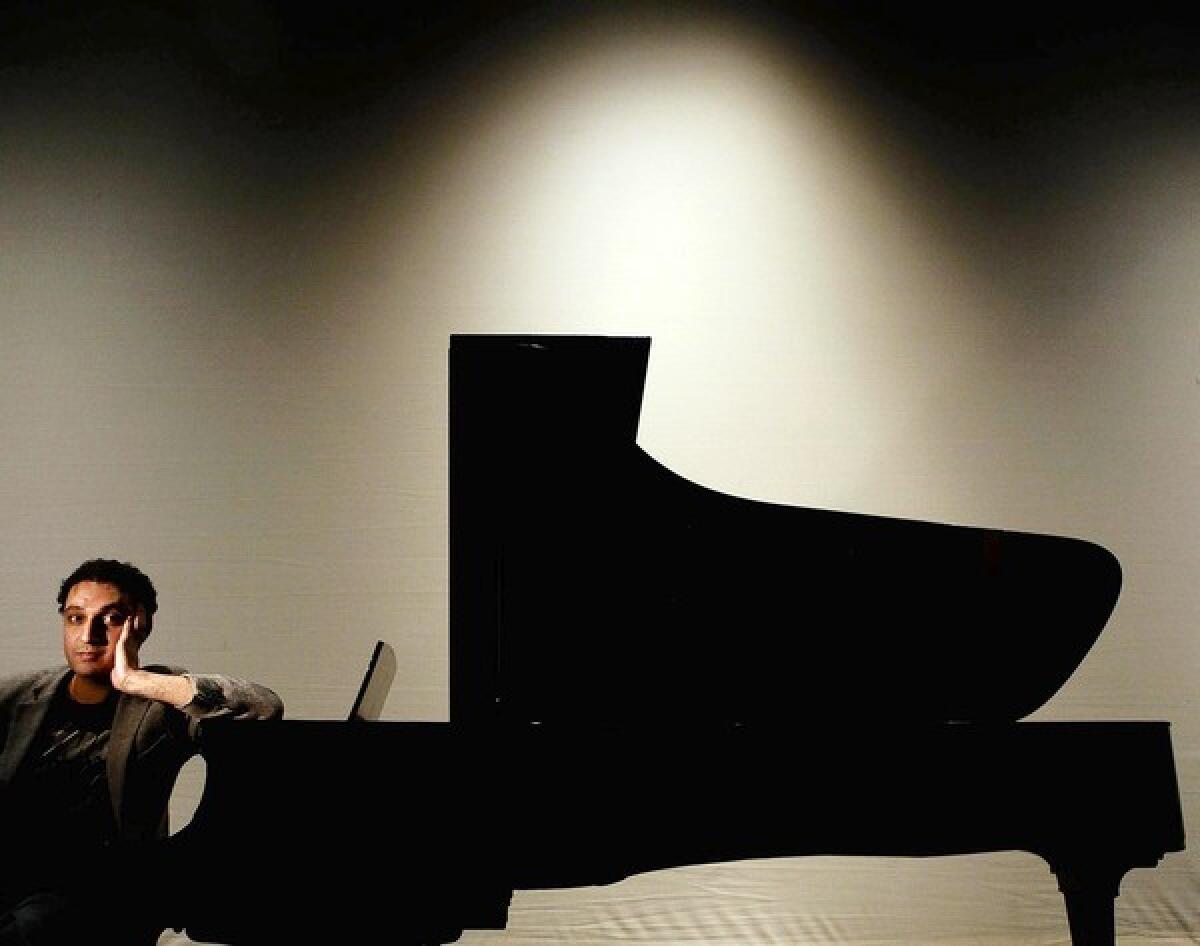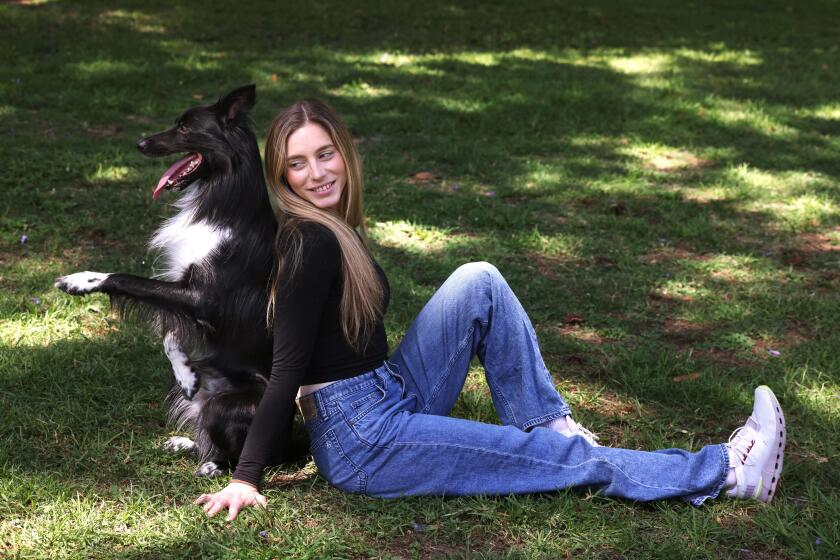Mohammed Fairouz is a composer of the world

Voices rose in a soft hum, as if bees buzzing in a distant jar. The chorale conductor awakened the air with his baton and the composer, wearing a Batman T-shirt and blue suede shoes and looking disheveled after a flight from New York, closed his eyes and listened to a poem of war.
The voices struggled and turned timid. The conductor hushed the choir. Hands riffled through the text of Symphony No. 3: “Poems and Prayers.” Something was amiss — a piercing sound not summoned — in Room 1325 at UCLA’s Schoenberg Hall.
“All I’m hearing right now is pretty music,” said Mohammed Fairouz, the composer, who at 28 was not much older than the 70 or so faces staring back at him. Skateboards tilted against a wall, a late-arriving baritone took his seat. “Could you sing the words as if you are the mothers of this tribe? This is one of the great Israeli poems. ‘Memorial Day for the War Dead.’ Use the consonants, use the vowels. Enjoy the way this guy manipulated language. It’s chilling.... Don’t be nerdy about this.”
PHOTOS: Arts and culture in pictures by The Times
The conductor, Don Neuen, his face animated, again raised his baton. The voices lifted; the tribal mothers sang out and were heard.
“That’s very, very good,” said Fairouz, adding with unabashed earnestness. “This is like one of the hardest passages of choral music ever written.”
“We’ve noticed,” said Neuen.
Fairouz is a talented, eclectic — often arrestingly so — and quite busy composer. His work is at once classical, current and global, a mingling of rhythms and tones, as attuned to Brahms and other “dead white men” as they are to the inflections of Middle Eastern melodies. The composer, a shrewd reader of politics, is working on an uncommissioned opera on the life and assassination of former Pakistani leader Benazir Bhutto.
“I don’t borrow, I steal,” said Fairouz, who has the confidence, and at times the brashness, born of intuitive passion and early success. “You step out of a cab and you listen to the Punjabi beats coming from a radio and then you hear Greek music while passing a deli.... How can you separate yourself from what you hear?”
CRITICS’ PICKS: What to watch, where to go, what to eat
He bristles at the mention of cultural categorization, fixed national identities and musical boundaries. An American of Arab descent who was raised mostly in New York — his parents, both doctors, are of Palestinian heritage — Fairouz studied at the Curtis Institute of Music and the New England Conservatory. He has written operas, symphonies, chorals, chamber works and hundreds of songs. He has penned works for Imani Winds, Borromeo String Quartet and clarinetist David Krakauer.
“I’m not some exotic thing who flew in on a magic carpet,” he said, sitting in a lounge in Schoenberg Hall. “I went to Western conservatories and got classical training.... Maybe identity shouldn’t matter. We can move beyond the ideas of people being tokens.... I’m not drenched in [historical] baggage. A future of nihilism and cynicism. How would that be appealing to someone today in their 20s? It’s not sexy at all.”
The BBC has called Fairouz “one of the most gifted composers of his generation.” The New York Times described him as an important new artistic voice, and a review in September noted: “[H]is Middle Eastern roots show through in the music itself, which skillfully blends Arabic maqam modes with Western forms. There is much to like about Mr. Fairouz’s unfailingly melodic music, but there was a lack of structural vigor and dramatic tension in many of the works presented here that resulted in moments of aimless drift.”
Cultural crosscutting infuses his work, and his music, notably through voice and clarinet, embodies the dispossession and mournfulness as well and the tumult and rage of the Middle East not only through the centuries but amid today’s bloodshed and unfinished revolutions. “Tahrir,” inspired by the 2011 Egyptian uprising, features a solo clarinet that dips and soars, scats and swoops as if a herald unshackled to call forth a new era. In “Poems and Prayers,” the clarinet is a wavering voice — a kind of lullaby — between a mother and her dead son.
PHOTOS: Conductors’ pop music favorites
The work will be performed by the UCLA Philharmonia, the university’s Chorale and Chorus and guest soloists at Royce Hall on Dec. 8, preceded by a recital Dec. 5 on campus that will feature two other Fairouz pieces. The music is part of weeklong program called “Listening to the Other,” which includes works by Israeli composers Tsippi Fleischer and Betty Olivero, whose work Fairouz came to admire as a teenager. He has also been influenced by Schubert, Stravinsky, Stephen Sondheim, Ravi Shankar, Kurt Weill and the Egyptian singer Umm Kulthum.
“Mohammed Fairouz is a remarkable young composer. He’s writing music that is challenging, communicative and accessible,” said Neal Stulberg, UCLA’s director of orchestral studies who will be conducting the Dec. 8 performance. “He’s one of a generation of composers who have been more widely exposed to world music than any generation before.”
“Poems and Prayers” speaks to Fairouz’s multilingualism and reverence for poets. The piece is a fusion of Arab and Jewish poems by Mahmoud Darwish, Yehuda Amichai and Fadwa Tuqan set to a Western musical structure. The poem by Tuqan, a Palestinian writer who died in 2003, is imbued with the despair of an unrequited dream.
“Oh how I hate to sit down and write
on this day
Will I protect my family with words?
Will I save my country with words?
All words, today, are
salt never flowering in this night …”
“We desperately need a return to language,” Fairouz said, citing the world’s many turmoils from Egypt and Syria to the rabid partisanship in Congress. “These are fueled by a deterioration over how we communicate with one another. We need a return to poetry. Poetry is the exaltation of language.”
Fairouz has coal-black curly hair and wide eyes. His mind seems in ceaseless spin. He can be as spontaneous as his musical scales but can also disappear into the silence between notes. Sitting beneath the conductor during the choral rehearsal, he listened, sang along and, at one point, jumped up and rushed to the piano, striking a key and saying, “This is pretty aggressive stuff. You really need to go for that K.”
He wanted the choir to slip into the mind of God, to understand a poet’s anger, sarcasm, humor and brokenness over the toll of war. He wanted no restraints.
“I know ladies can sound scary on an F-sharp,” he said. “You are doing a fabulous job.”
PHOTOS: Disney Hall conductors
A few students gathered around him after rehearsal, making his youth more evident; one could imagine him gliding across campus on a skateboard. He thinks of himself this way: “I’m intense but very humorous, and I like to think I can have a drink with someone.” The students stayed a bit longer and drifted away as a piano and a violin echoed down a corridor of closed doors. His life — “Google knows more about me than I do” — is a map of such hallways. He can’t remember the title, but when he was 7 he composed his first tune from a story in a children’s book. “I didn’t know what I was doing. I was a kid,” he said. “I assumed everyone reading this book heard the same tune. But I was really inventing a melody.”
He walked into a rainy night, carrying a satchel and needing a ride to the airport. He spoke of war and traffic, publicists and artists and sounds, so many sounds — spiraling, quick, meditative — to be set to music. He had earlier noted his love of New York and how its buildings and skyline had become his friends. His symphony “In the Shadow of No Towers” is a musical adaptation of Art Spiegelman’s post 9/11 graphic novel of the same name.
“I have to write in the madness,” he once told the BBC, “and I have to write in the monomaniacal grid that is Manhattan.”
The airport glowed in the windshield. He said he likes to travel. He was heading to New York and later Seattle. He checked his satchel; Batman peeked from beneath his gray blazer. An hour or so earlier, he had said, “I don’t like describing myself. I don’t think it’s relevant anymore.”
He stepped out of the car. A bus whooshed past, a baggage cart rattled. He hurried through the clamor and disappeared into the terminal, as if a restless character in an unfinished opera.
More to Read
The biggest entertainment stories
Get our big stories about Hollywood, film, television, music, arts, culture and more right in your inbox as soon as they publish.
You may occasionally receive promotional content from the Los Angeles Times.











